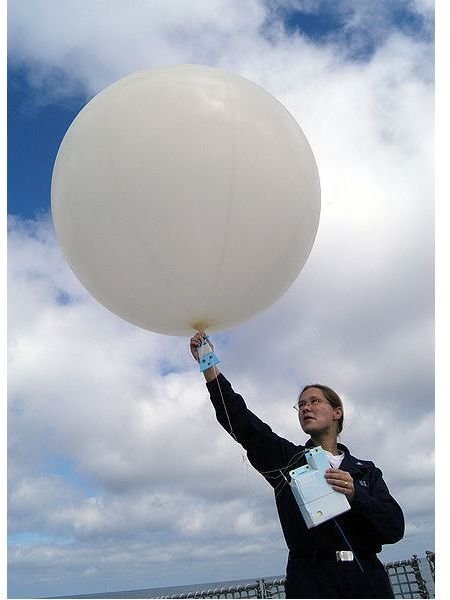Options for the Career Meteorologist
In the 1950’s, the only major employers of meteorologists were the Weather Bureau, universities, and the military. Accelerated global warming, dwindling freshwater resources, and increased pollution have since then increased the scope of meteorology, making the profession exciting, challenging, highly rewarding, and much in demand. Many government and private meteorological organizations now hire meteorologists to monitor, assess, and predict changes to the atmosphere and environment. Recent estimates hold weather and climate sensitive industries having a value of about $2.7 trillion in the U.S.
Image Credit: Wikimedia Commons/U.S. Navy
Weather Forecasting
The traditional role of meteorologists is weather forecasting.
Career meteorologists into weather forecasters study temperature, humidity, wind conditions, air pressure, air quality, rainfall, and other atmospheric conditions through instruments such as rain gauge, weather balloons, weather aircraft, radars, radiosondes, and satellites. They analyze the collected data to determine the short term and long term atmospheric changes.
Specialized branches of weather forecasting careers include:
- Broadcast meteorologists, employed by the many media houses turn detailed and complex weather related information into easily understood weather stories on a regular basis that have become extremely popular on mobile devices. The American Meteorological Society certifies broadcast meteorologists based on a qualifying exam and sample program tapes.
- Aviation meteorologists, employed by airlines and airports provide weather information such as winds, turbulence, thunderstorms and the like that impact aircraft in the air. Such information helps avoid delays, lessen fuel consumption, and ensure the safety and comfort of passengers.
- Marine meteorologists, employed by shipping lines and various maritime authorities provide information such as sea turbulence, storms, winds, fog, and other hazards that affect navigation. They help determine the navigation path and ensure safety for ships. Marine meteorologists also support search-and-rescue activities, assist control of oil spills, and aid investigations of marine accidents by providing weather and sea conditions at the time of accidents.
Research Meteorology
Research meteorologists, like forecasters, collect data from various sources and analyze the same using powerful computers, but unlike forecasters who concentrate on future events, research meteorologists try to identify patterns of occurrence for natural phenomena such as tornadoes, windstorms, cyclones and the like.
- Climatologists are research meteorologists who examine averages, extreme values, and frequency of various weather elements such as rainfall and temperature over an extended period of 30 years or more. The information provided by climatologists help people make decisions about weather-sensitive activities such as construction, tourism, agriculture, marine life, insurance, and even survival in some small islands.
- Environmental meteorology is a branch of research meteorology. Environment meteorologists develop dispersion models to predict air quality in terms of spread of pollutants and the like during different weather conditions, and issue early warnings when the levels of pollutants reach dangerous levels. The information provided by environmental meteorologists are invaluable in containing air borne pandemics such as bird flu, SARS, or even nuclear accidents.
Research meteorologists find employment in federal and state governments, environment research bodies, regulatory authorities and several large corporations to help determine patterns that help authorities implement effective solutions to mitigate man made disasters such as global warming and pollution and increase preparedness to counter natural effects such as hurricanes.
The Private Sector
 Much of research methodology career options lie in the private sector. The American Meteorological Society certifies qualified meteorologists as Certified Consulting Meteorologists (CCMs), making them eligible to work as independent consultants, solving various weather related problems for businesses.
Much of research methodology career options lie in the private sector. The American Meteorological Society certifies qualified meteorologists as Certified Consulting Meteorologists (CCMs), making them eligible to work as independent consultants, solving various weather related problems for businesses.
The scope of such independent consultants and private sector meteorological firms in general extend to:
- Industrial forecasting: The weather has a profound and wide-ranging impact on businesses and utilities, and predicting the weather to help businesses remain prepared offer the single biggest work for private sector meteorologists. For instance, cold weather increases demand for many things ranging from energy to thermal underwear and from video rentals to hot pizzas. Advance information of the weather help anticipate and remain prepared for the demand in all these cases. Again, baseball teams hire private forecasters to predict rains and help ground crews remain ready to put on the tarps.
- Agricultural meteorology: Agro meteorologists specialize on the impact of weather on crop development including factors such as pests, diseases, and soil moisture, rainfall patterns, temperatures, and humidity. The information they provide help farmers, anglers, foresters, and horticulturalists plan both their day-to-day and long-term activities.
- Physical meteorology: Physical meteorologists study the chemistry of the atmosphere and play a vital role in providing advice on how best to harness renewable energy resources such as wind energy.
- Forensic meteorology: The role of forensic meteorologists is to collect, interpret, and analyze atmospheric data to aid insurance investigations, judicial trials, and actions of environmental regulatory agencies. They validate cases such as whether natural fog or pollutants caused poor visibility that led to the vehicle accident, whether the downed power line that caused electrocution was the fault of a tornado or negligence of the power utility, and the like.
Image Credit: Wikimedia Commons/Pilgab
Lecturing
Another career opportunity for meteorologists is lecturing at a university or college. Most meteorology professors continue to do basic research with their students and find it rewarding, for they get to do what they like rather than doing the specific job the corporate organization assigns them, which leads to lower job stress.
Available indicators show an increase in the demand for meteorologists in the coming years. Salaries vary depending on education, experience, and place of employment. The Bureau of Labor Statistics shows an average annual salary of $80,499 for meteorologists in the federal government, and $70,100 for career meteorologists in the private sector and universities.
Looking for more options? Check out the rest of Bright Hub’s collection of career guides and profiles.
